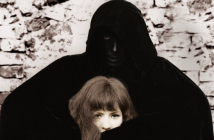
Cast: Iain De Caestecker, Alice Englert, Allen Leech
Director: Jeremy Lovering
Country: UK
Genre: Thriller
Editor’s Notes: In Fear plays at Cineplex Cinemas Yonge-Dundas on March 14th, 15th, 17th, 18th and 19th.
Cinephiles live in this strange limbo, yearning for the new but celebrating the old. There is nothing more exciting to a rabid consumer of film to see something new. The formulaic and familiar plots of swaths of multiplex fare tend to bore. These formulas have been established by films that were once untested, so for something that seems so paint-by-numbers, it must be executed well to earn a modicum of praise. There is something comfortable about the tried-and-true that when done with effort and attention to the necessities of good filmmaking can still easily win us over. In Fear is a slave to the familiar, but at least it’s done well.
There is something comfortable about the tried-and-true that when done with effort and attention to the necessities of good filmmaking can still easily win us over. In Fear is a slave to the familiar, but at least it’s done well.
Tom (Iain De Caestecker) and Lucy (Alice Englert) are a brand new relationship. Two weeks strong, they have planned a trip to a music festival. While they start their trip alone, at the festival the safety and comfort of friends promises to keep things from getting too serious. Tom, however, sees this time of solitude as an opportunity to get closer with Lucy. In his own vision of a romantic gesture, he has reserved a hotel room for the two to relax before they head out to the rambunctious festival. Lucy hesitantly agrees and they hop in the car to be guided to the hotel. As they get closer to their lodging, their GPS and cell phones lose reception, and they are slaves to the local signage, becoming lost in a labyrinth of country roads. Frustration turns to panic as they begin to realize that they are not alone.

In Fear immediately draws you in with the strength of its characters. As Tom awkwardly leaves a voicemail for Lucy, initiating what will become the central relationship, you come to know the type of person he is. He dwells in this area of awkward confidence, possessing an inability to be absolutely suave, but just charming enough for it to be endearing. In this short voicemail, we know Tom. Perhaps the limited cast list, rounding out at no more than three with speaking roles, allows this to blossom so well. Lucy and Tom don’t just feel like characters, but actual people in a terrible situation. The writing is to thank for a bit of the authenticity, but much of the honesty resides in the actors’ performances. Caestecker knows exactly how to play the shy smile to its fullest effect, and is likeable if in spite of his dickish ways. Englert initially comes off as cold and distant, but her skepticism and trepidation is more than natural for the state of Tom and Lucy’s relationship. As this is a horror film, the characters are bound to make bad decisions, but here they seem reasonable. The characters are written and played in a manner that subtly notes the idiocy of the choice, but recognizes the necessity of it in this situation.
Writer-director Jeremy Lovering starts building the suspense from the get-go. The haunting titles hint at something dark beneath the surface, while he disarms us with the inherent discomfort of leaving a voicemail.
Writer-director Jeremy Lovering starts building the suspense from the get-go. The haunting titles hint at something dark beneath the surface, while he disarms us with the inherent discomfort of leaving a voicemail. Much of the film takes place within the confines of a small sedan and Lovering uses this to its fullest effect. As the tension builds, his canted angles somehow make the car all the more confined. The kineticism with which it is shot pulls you right into the car with Tom and Lucy. The subtlety of his direction is most impressive. You are fully aware of the type of film you are watching, and the simplistic plot is predictable when looked at from afar. However, Lovering writes and directs it all so genuinely that the fear sneaks up on you. The jump scares just add a vertical element to the family of already clenched muscles that your body has adopted.
The basis of the film is absolutely derivative. Even a hint at a plot description results in involuntary eye rolls. Nevertheless, for all the risks it doesn’t take, it certainly takes a big one in the choice of its big bad. Rather than allowing the monster to reside in some kind of supernatural space, an un-harmable sociopath with only a drive to kill, In Fear flat out introduces him to you. Not only does the villain have a name, he has a face and a voice. He endears himself to our leads and is downright pleasant. The dangerous choice makes him someone that cannot be simply dismissed. It is far more frightening to have this innocuous element revealed as deadly. Rather than the film being only about survival, it transforms into a film about the anger of betrayal, the thirst for vengeance, and our own unspoken vulnerability. Once the character is introduced, our gut tells us that he is bad, but we just cannot help but to hear him out, to believe for just a second that he is like us. The strength doesn’t come from the reveal, but the mirror that the proximity to evil presents.
In Fear is certainly not breaking new ground. Its set up is standard, and at times it is overly practiced and simply unremarkable. However, it is a film that surprises not in premise, but execution. Writer-director Jeremy Lovering builds the suspense gradually, yet effectively; crafting a dark atmosphere that slowly overtakes you. The characters are few and at times the dialogue sparse, but even with these little amounts, we come to understand who they are as people. This measured writing and character development has In Fear embodying the tropes of its genre, yet simultaneously rejecting them. The familiarity of In Fear is used to its greatest benefit, delivering a tight and stressful piece of cinema that forges something unique out of the staid.
[notification type=”star”]80/100 ~ GREAT. The familiarity of In Fear is used to its greatest benefit, delivering a tight and stressful piece of cinema that forges something unique out of the staid.[/notification]



